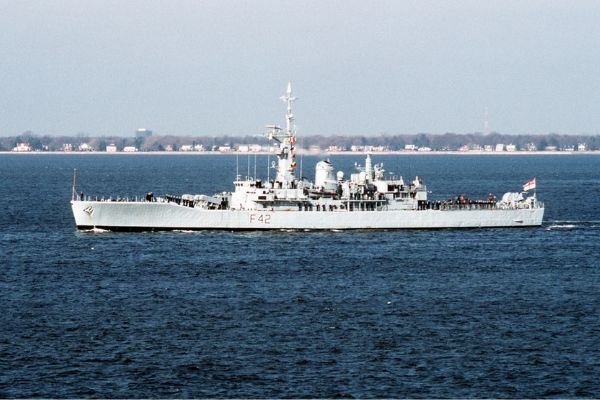Careers in the merchant marine offer the romance of the high seas and excellent tax-free pay and perks
Apart from the promise of the romance of the sea and the disciplined lifestyle it offers, a career in the merchant navy is also one of the most attractive in terms of remuneration. Even the chief executive of a multinational company in India doesnt quite enjoy the pay and perks of a chief engineer or captain of a blue-chip foreign shipping company. And jobs in the upper echelons of the merchant marine are available in plenty.
The merchant navy is composed of vessels (ships) which carry cargo (bulk carriers), oil (tankers), or passengers (liners). These vessels may be owned by Indian or foreign shipping companies. On board the most important personnel are the navigating officers and marine engineers.
Aspirants to a career in the merchant marine can opt for either the three-year B.Sc nautical science course or the four-year marine engineering programme. Candidates should have passed the Plus Two examination or equivalent with physics, chemistry, and mathematics. Obviously good physical and mental health is important as is normal vision in each eye (6/6) though for entry into the marine engineering stream spectacles wearers with plus or minus 2.5 are eligible. For entry the upper age limit is 20 years (25 years for SC/ST).
IIT-JEE scores are assessed to select candidates for counselling, interview, and medical examination for admission into the Marine Engineering Research Institute (MERI) at Kolkata and T.S. Chanakya (formerly T.S. Rajendra) situated in Navi Mumbai (nautical science course). IIT-JEE scores are also assessed for shortlisting candidates for the position of trainee navigating officer cadets in the Shipping Corporation of India (SCI). IIT-JEE forms are usually available in July and merchant marine application forms can be obtained from the Directorate General of Shipping, Jahaz Bhawan, W.H. Marg, Mumbai 400 001.
After completing the three-year nautical science programme and acquiring a second mate competency certificate (foreign going) from the T.S. Chanakya, cadets are usually appointed as third/second officers aboard a merchant vessel. To qualify for subsequent promotions, second officers have to render further sea service and also pass the first mate (FG) and master (FG) examinations. A certificate of competency as master (FG) qualifies an officer to assume the captaincy of a merchant ship.
In the marine engineering stream, after completion of the four-year training programme at MERI, a cadet is taken aboard as a junior engineer officer on a merchant vessel. Subject to satisfactory performance and passing of requisite examinations, junior engineer officers advance their careers as third engineer, second engineer and ultimately chief engineer of a merchant ship.
QUICK PROMOTIONS. The merchant navy offers excellent start-up pay to navigating officers and marine engineers in the region of Rs.60,000 per month by Indian companies while foreign shipping companies pay over $2,500 (Rs.120,000) for starters with the captains pay packet swelling to $5,000 (Rs.240,000) per month. Prospects of promotion are directly linked to passing the requisite competency examinations. Pay packets swell with promotions and for enterprising officers promotions can follow in quick succession.
According to industry sources theres an urgent need for trained merchant marine officers to meet the requirements of international shipping companies. Industry predictions suggest that this requirement will increase in the next few years, especially if the world economy (and population) continues to expand as expected, and if the quantity of goods moved by sea continues to increase.
Fifty-one-year-old Capt. Ashwani K. Jhingans romance with the sea began in 1976 after he graduated in nautical science from the T.S. Rajendra and signed up with the Shipping Corporation of India. Promotions came fast as he passed the examinations of second mate, first mate, masters and even the Extra Masters Certificate of Competency, the highest qualification and one which very few Indians have acquired. After 12 years of captaining SCI ships all over the world, Jhingan worked for a year with the Directorate of Shipping as a nautical surveyor.
After 14 years of sailing the high seas, Jhingan, who had also equipped himself with an MBA degree decided to take a shore job in 1990. Formerly vice-president of the Mumbai-based Forbes Gokak Ltd and handling the agency business of the Hong Kong-based Orient Overseas Container Service in India, Jhingan describes his years in the merchant marine as a great experience”. The merchant marine is a rewarding profession both physically and financially. One gets to go abroad, see places, and meet people from numerous countries which broadens ones outlook. The only downside is that you are away from your family for long periods but that is compensated by four-and-a-half months leave per year. Moreover, one of the privileges of the captain of a ship is that you can take your family with you. Most merchant navy officers sail for about 15 years and then take up shore jobs which are easily available,” says Jhingan.
According to Jhingan, theres a growing demand for Indian merchant marine officers as they are hard working, speak excellent English, and provide cost-effective and competent personnel for shipping companies the world over. Moreover, Indian naval institutes have a good reputation for delivering excellent professional training. Theres a bright future ahead for young people entering the merchant marine. Domestic demand for merchant navy personnel is rising and theres plenty of growth potential for Indian shipping companies, if privatisation is accelerated,” he says.
